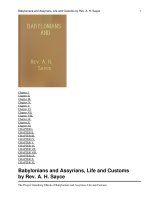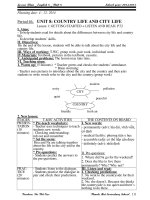Doxa and common life (Pierre Bourdieu)
Bạn đang xem bản rút gọn của tài liệu. Xem và tải ngay bản đầy đủ của tài liệu tại đây (70.65 KB, 11 trang )
In Conversation
Pierre Bourdieu and Terry Eagleton
Doxa and Common Life
Terry Eagleton Hello and welcome.* Pierre Bourdieu and I will
discuss some of the themes in our new books—primarily his book,
Language and Symbolic Power, but also my book, Ideology.1 And then we
will invite questions and comments.
I would like to welcome you, Pierre, on one of your too rare visits to
this country. We are delighted to see you and to have these translated
essays. One of the themes of your work is that language is as much—
or is perhaps more—an instrument of power and of action than of
communication. This is a theme that informs everything you write in
this book and that leads you to be properly hostile, as I would see it,
to any mere semiotics. You want to look instead at what you call at
one point ‘the social conditions of the production of utterances’, and
also, I suppose, at the conditions of the reception of utterances. In
other words, you are arguing that what matters in talk, in discourse, is
not some power inherent in language itself, but the kind of authority
or legitimacy with which it is backed. And that leads you to mobilize
concepts that, I think, many of us are very familiar with from your
other work—such as ‘symbolic power’, ‘symbolic violence’, ‘linguistic
capital’ and the rest. I would like to ask you whether I have got this
right and to explain how these processes might relate to the concept of
ideology—are they synonymous, or is ideology for you something
quite different? The concept of ideology does sometimes crop up in
your work, but it is not a central concern in this particular book.
Pierre Bourdieu Thank you for what you say about my book; in
only a few sentences you have summarized its main intention, so it is
now easier for me to answer the question. In fact, I tend to avoid the
word ‘ideology’ because, as your own book shows, it has very often
been misused, or used in a very vague manner. It seems to convey a
sort of discredit. To describe a statement as ideological is very often
an insult, so that this ascription itself becomes an instrument of
* What follows is an edited transcript of a discussion—one in a series of ‘Talking
Ideas’—between Pierre Bourdieu and Terry Eagleton that took place at the Institute of
Contemporary Arts, London, on 15 May 1991.
1
Pierre Bourdieu, Language and Symbolic Power, Polity Press, Cambridge 1991, £35.00
hbk; Terry Eagleton, Ideology, Verso, London 1991, £10.95 pbk, £32.95 hbk.
111
symbolic domination. I have tried to substitute concepts like ‘symbolic domination’ or ‘symbolic power’ or ‘symbolic violence’ for the
concept of ideology in order to try to control some of the uses, or
abuses, to which it is subject. Through the concept of symbolic violence I try to make visible an unperceived form of everyday violence.
For example, here in this auditorium now I feel very shy; I am anxious
and have difficulty formulating my thoughts. I am under a strong
form of symbolic violence which is related to the fact that the language
is not mine and I don’t feel at ease in front of this audience. I think
that the concept of ideology could not convey that, or it would do so
in a more general manner. Sometimes we must refurbish concepts—
first, to be more precise, and second, to make them more alive. I am
sure you agree that the concept of ideology has been so used and
abused that it does not work any more. We no longer believe in it;
and it is important, for example in political uses, to have concepts
that are efficient and effective.
TE This prompts me to explain why I still write about ideology,
even though I agree with what you say about the frequent vagueness of
the concept and that there are many different notions of ideology in
circulation. My book was partly an attempt to clarify the concept. I
also think there are reasons now why the concept of ideology seems to
be superfluous or redundant, and I try to look at these in my book
too. One is that the theory of ideology would seem to depend on a
concept of representation, and certain models of representation have
been called into question and thereby also, so it is thought, the notion
of ideology. Another reason—perhaps a more interesting one—is that
it is often felt now that in order to identify a form of thought as ideological you would need to have some kind of access to absolute truth.
If the idea of absolute truth is called into question then the concept of
ideology would seem to fall to the ground with it.
There are two further reasons why it seems that ideology is no longer
a fashionable concept. One is what has been called ‘enlightened false
consciousness’, namely, that in a postmodern epoch the idea that we
simply labour under false consciousness is too simple—that people
are actually much more cynically or shrewdly aware of their values
than that would suggest. This again calls the concept of ideology into
question. Finally, there is the argument that what keeps the system
going is less rhetoric or discourse than, as it were, its own systemic
logic: the idea that advanced capitalism works all by itself, that it
doesn’t any longer need to pass through consciousness to be validated,
that it somehow secures its own reproduction. I actually am dubious
about whether all of that is sufficient to ditch the concept of ideology.
I accept there is a force in those various points, but I suppose one
reason I want to retain the concept of ideology is that I do think there
is something that corresponds to the notion of false consciousness,
and I am interested in your own work in that respect. Can I put it this
way: when you use concepts like doxa, spontaneous belief or opinion,
then in a sense those are operating as notions of ideology for you, in
that doxa would seem unquestionable and natural. On the other
hand, does that allow you to talk about false consciousness in the
sense of false notions or propositions that actually sustain unjust
112
systems of power? Do you want to talk about false consciousness only
in terms of naturalization or universalization, or would you want to
talk in more epistemological terms about the relation of false or true
ideas to social reality?
I agree with the first part of your reasoning—the doubts you
expressed about the concept of ideology. I agree and can expand on
your objections. In particular, I think that one of the main uses of the
concept of ideology was to make a strong break between the scientist
and others. For example, Althusser and those influenced by him made
a very violent symbolic use of the concept. They used it as a sort of
religious notion by which you must climb by degrees to the truth,
never being sure to have achieved the true Marxist theory. The theorist was able to say ‘You are an ideologist.’ For example, Althusser
would refer disparagingly to the ‘so-called social sciences’. It was a
manner of making visible a sort of invisible separation between the
true knowledge—the possessor of science—and false consciousness.
That, I think, is very aristocratic—indeed one of the reasons why I
don’t like the word ‘ideology’ is because of the aristocratic thinking of
Althusser.
PB
So now to move on to more familiar ground: why do I think the
notion of doxa is more useful? Many things that are called ideology in
Marxist tradition in fact operate in a very obscure manner. For
example, I could say that all the academic systems, all the educational
systems, are a sort of ideological mechanism; they are a mechanism
that produces an unequal distribution of personal capital, and they
legitimate this production. Such mechanisms are unconscious. They
are accepted and that is something very powerful, which is not
grasped, in my view, in the traditional definition of ideology as representation, as false consciousness. I think that Marxism, in fact,
remains a sort of Cartesian philosophy, in which you have a conscious
agent who is the scholar, the learned person, and the others who don’t
have access to consciousness. We have spoken too much about
consciousness, too much in terms of representation. The social world
doesn’t work in terms of consciousness; it works in terms of practices,
mechanisms and so forth. By using doxa we accept many things without knowing them, and that is what is called ideology. In my view we
must work with a philosophy of change. We must move away from
the Cartesian philosophy of the Marxist tradition towards a different
philosophy in which agents are not aiming consciously towards
things, or mistakenly guided by false representation. I think all that is
wrong, and I don’t believe in it.
TE If I have understood you, the concept of doxa is what might be
called a much more adequate theory of ideology. But I have two worries about that reformulation, which I would like to explain. One is
that the concept of doxa stresses the naturalization of ideas. While
this does allow you to look at unconscious mechanisms, isn’t it too
simple to claim that all symbolic violence or ideology is actually naturalized? That is, can’t people be in some way more critical, even more
sceptical, of those values and beliefs, and nevertheless continue to
conform to them? Don’t you rather overstress, in other words, the
naturalizing function of ideology or doxa? And secondly, are you not
113
in danger of accepting too quickly the idea that people do legitimate
prevailing forms of power? There are presumably different kinds of
legitimation, all the way from an absolute internalization of ruling
ideas to a more pragmatic or sceptical acceptance. What room does
your doctrine leave for that kind of dissent, criticism and opposition?
PB That is a very good question. Even in the most economistic
tradition that we know, namely Marxism, I think the capacity for
resistance, as a capacity of consciousness, was overestimated. I fear
that what I have to say is shocking for the self-confidence of
intellectuals, especially for the more generous, left-wing intellectuals. I
am seen as pessimistic, as discouraging the people and so on. But I
think it is better to know the truth; and the fact is that when we see
with our own eyes people living in poor conditions—such as existed,
when I was a young scholar, among the local proletariat, the workers
in factories—it is clear that they are prepared to accept much more
than we would have believed. That was a very strong experience for
me: they put up with a great deal, and this is what I mean by doxa—
that there are many things people accept without knowing. I will give
you an example taken from our society. When you ask a sample of
individuals what are the main factors of achievement at school, the
further you go down the social scale the more they believe in natural
talent or gifts—the more they believe that those who are successful are
naturally endowed with intellectual capacities. And the more they
accept their own exclusion, the more they believe they are stupid, the
more they say ‘Yes, I was no good at English, I was no good at French,
I was no good at mathematics.’ Now that is a fact—in my view it is an
appalling fact—one that intellectuals don’t like to accept, but which
they must accept. It doesn’t mean that the dominated individuals
tolerate everything; but they assent to much more than we believe and
much more than they know. It is a formidable mechanism, like the
imperial system—a wonderful instrument of ideology, much bigger
and more powerful than television or propaganda. That is the main
experience I want to convey. What you say about the capacity for
dissent is very important; this indeed exists, but not where we look for
it—it takes another form.
TE Yes, you do talk about what you call ‘heterodoxy’, which is an
oppositional kind of language. What Marxists call pessimism in your
work, you yourself would see, presumably, as realism. One may agree
with that, but on the other hand I know that you don’t want to sound
too much like Michel Foucault. You don’t wish, by virtue of stressing
that material realism, to move into a theory of power which you yourself have criticized, I think quite properly, as too abstract, too metaphysical, too all-pervasive; and you want to leave room for some kind
of political opposition. My objection to the idea of doxa is that you
seem to be saying that there is internalization of dominant and
oppressive beliefs, but there is also, in a second movement, something
that can be broken and thereby enable a heterodoxy to emerge. But
isn’t that too chronological? Maybe I’m caricaturing it, but is doxa
not itself a more contradictory affair? That is, can people believe and
not believe, or believe at different levels?
PB No. That is related to the programme of the philosophy of man
114
we have, of the philosophy of action and so on. I would say that as
long as you think in terms of consciousness, false consciousness,
unconsciousness and so on, you cannot grasp the main ideological
effects, which most of the time are transmitted through the body. The
main mechanism of domination operates through the unconscious
manipulation of the body. For example, I have just written a paper
about the processes of male domination in a so-called primitive
society. They are the same as in our society, but a lot more visible. In
the former case the dominated persons, the women, acquire domination through bodily education. I could go into detail—for instance,
girls learn to walk in a determinate manner, they learn to move their
feet in a particular way, they learn to hide their breasts. When they
learn to speak, they don’t say ‘I know’; they say ‘I don’t know’. For
example, if you ask a woman for directions, she will say ‘I don’t
know’. We have the equivalent process, but it operates in a much
more subtle manner—through language, through the body, through
attitudes toward things which are below the level of consciousness.
But this is not mechanistic; it does not refer us to unconsciousness. As
soon as we think in those terms, it becomes clear that the work of
emancipation is very difficult; it is a question of mental gymnastics as
much as consciousness-raising. And as intellectuals we are not used to
that. I call it a scholastic bias—a bias to which we are all exposed: we
think that the problems can be solved only through consciousness.
And that is where I differ from Foucault, and would draw a contrast
with his important concept of discipline. Discipline, in French at
least, points towards something external. Discipline is enforced by a
military strength; you must obey. In a sense it is easy to revolt against
discipline because you are conscious of it. In fact, I think that in terms
of symbolic domination, resistance is more difficult, since it is something you absorb like air, something you don’t feel pressured by; it is
everywhere and nowhere, and to escape from that is very difficult.
Workers are under this kind of invisible pressure, and so they become
much more adapted to their situation than we can believe. To change
this is very difficult, especially today. With the mechanism of symbolic violence, domination tends to take the form of a more effective,
and in this sense more brutal, means of oppression. Consider contemporary societies in which the violence has become soft, invisible.
TE I would suggest there is a kind of irony there, because on the one
hand you are reacting against what you see as an excessive emphasis
on consciousness. I think that is right, but some of the Marxist tradition has registered that too. At the same time that you were developing these theories, the Marxist tradition itself, in the work of Althusser,
whatever its limits, was trying to shift the concept of ideology on to a
much less conscious, and much more practical, institutional place,
which in a way comes closer perhaps to your own position.
I would like to consider the point about political opposition or pessimism from a different perspective, one that informs a vital area of
your work now. You talk very boldly and, I think, very imaginatively,
about linguistic markets and the price or the value of utterances—
‘price formation’—and you deliberately transpose a whole Marxist
economic language into the cultural or symbolic spheres; and you
115
speak of the field of struggle in which people try to amass an amount
of cultural capital, whether in education or the arts or whatever. I think
this is very illuminating, not least your stress that in looking at the
phenomenon of art, we can’t go directly to the whole social field, but
have to pass through the particular artistic cultural field first. I think
that is enormously useful. However, couldn’t it be argued that you
come out with a notion of the whole of human practice, action and
language as a war, in which players will try to increase their stakes, to
invest more effectively to the detriment of other players? That is a true
description of many fields of our experience, but are there not other
forms of discourse, other forms of action, which you couldn’t conceptualize so easily in those agonistic terms?
PB You are yourself giving a good example of the fact that such
forms exist, through your sympathetic engagement with my ideas!
Anyway, that is an important question, and one that I ask myself; I
agree that it is a problem. I don’t know why I tend to think in those
terms—I feel obliged to by reality. My sense is that the kind of
exchange we are now engaged in is unusual. Where this happens, it is
the exception based on what Aristotle called ´␣ [‘philia’]—or
friendship, to use a more general expression. ⌽´␣ is, according to
Aristotle, an economic exchange or symbolic exchange that you may
have within the family, among parents or with friends. I tend to think
that the structure of most of the fields, most of the social games, is such
that competition—a struggle for domination—is quasi-inevitable. It
is evident in the economic field; but even in the religious field you will
find the description is right. In most fields, we may observe what we
characterize as competition for accumulation of different forms of
capital (religious capital, economic capital and so on), and things
being what they are, the undistorted communication referred to by
Habermas is always an exception. We can achieve this undistorted
communication only by a special effort when extraordinary conditions are fulfilled.
I would just add a word on the analogy between linguistic exchange
and economic exchange, which you referred to just now. This analogy,
in my view, is very fruitful in understanding many phenomena that
cannot be treated simply as communication, as language production.
Some English philosophers, like Austin, made a point of this; they saw
the presence of very important things in language—like giving orders,
for example, or making announcements—which do not conform to
the communication model. Many things cannot be understood in
terms of pure communication, and so by proposing my economic
analogy I try only to generalize and to give to an insight of analytical
philosophy a sociological foundation which it lacks. I don’t criticize
Austin; I say that he does not give a full account of the social conditions of possibility of the process he describes. So, though I may seem
very far from this philosophy of language, I am in fact very close.
TE Clearly, you are thinking sociologically as much as semiologically.
Running throughout the whole of your work is a sort of steady subtext
which is a deep preoccupation with the conditions of your own work
itself—or more generally, with the difficulty of a sociological discourse that seeks, for whatever good, potentially emancipatory,
116
reasons to analyse the common life. That is, there is a very powerful
commitment in your work—not always explicit, but present as a kind
of sensibility—to what one might inadequately call ‘the common life’.
This is one of many ways in which your work parallels that of
Raymond Williams in this country. But of course it is difficult for a sociologist involved in a highly specialized discourse to take that common
life as an object of analysis or even of contemplation. You, like myself,
don’t come from an intellectual background; and it seems to me that
your work is very interesting because it is marked by the tension
between some sense of common value that has nothing to do with
intellect in the first place, and the other dimension which is very much
to analyse the academic institution—the social condition of intellectuals and its implications. Do you think this biographical circumstance
helps to explain your preoccupations?
What you say is very sympathetic and generous. You have
expressed my personal feeling exactly. I try to put together the two
parts of my life, as many first-generation intellectuals do. Some use
different means—for instance, they find a solution in political action,
in some kind of social rationalization. My main problem is to try and
understand what happened to me. My trajectory may be described as
miraculous, I suppose—an ascension to a place where I don’t belong.
And so to be able to live in a world that is not mine I must try to
understand both things: what it means to have an academic mind—
how such is created—and at the same time what was lost in acquiring
it. For that reason, even if my work—my full work—is a sort of autobiography, it is a work for people who have the same sort of trajectory, and the same need to understand.
PB
TE We have some time for questions or comments. Would anyone
like to take up any of the points raised in the discussion?
It has been advanced as an argument against the concept of ideology that Marxism credited people with too much ability to recognize the truth, and that those
further down the social scale are less likely to recognize it. Isn’t it more the case
that people further down that scale don’t have the economic power that would
enable them to go to discussion groups and escape from the narrow circle of their
home life and recognize other possibilities? Do you think the part this has to
play is more significant than intellectual capabilities—that people have the
potential to recognize the wider truths, but their economic and family situations
prevent them from reaching them?
TE I argue in my book that the full business of internalizing, legitimating the authoritative power is itself a complex matter which
requires capacity, intelligence. A degree of creativity is needed even to
accept that one is being defined in a negative way, as low on the scale
or as oppressed. And it is a paradox, I think, that the legitimation of
a dominant power is never just a passive affair—a matter of taking it
into yourself; so the capacities you are talking about must be there
even for people to accept a dominant power, to define themselves in
relation to it. I would have thought that much of Pierre Bourdieu’s
work is about the conditions in which people can or can’t acquire
capital.
117
There is a sort of de facto division of labour of social production
with respect to major varieties of experience. Very often the persons
who are able to speak about the social world know nothing about the
social world, and the people who do know about the social world are
not able to speak about it. If so few true things are said about the
social world, the reason lies in this division. For example, doxa
implies a knowledge, a practical knowledge. Workers know a lot:
more than any intellectual, more than any sociologist. But in a sense
they don’t know it, they lack the instrument to grasp it, to speak
about it. And we have this mythology of the intellectual who is able to
transform his doxic experiences, his mastery of the social world, to an
explicit and nicely expressed presentation. That is a very difficult
problem for social reasons. For example, if the intellectual tries to
reproduce the experience of a worker, as in France after 1968, he
encounters the experience of a worker who lacks the habits of an intellectual. Many of the things he is appalled at are in fact quite run-ofthe-mill. He must be able to include in his vision a description of the
worker’s experience—the fact that it is an experience from his point
of view. And that is very difficult. One of the reasons why intellectuals
don’t pay attention, in my view, is that they have very many interests
related to cultural capital. I will give you an example: I was always
shocked by what Marx said about Proudhon; he was very hard on
him. Marx said ‘He is a stupid French petty bourgeois’; that Proudhon only writes aesthetics from the point of view of the Greek aesthetes; that Proudhon was very naive. Marx, for his part, learnt
Greek; when he was eighteen he was able to write in Greek. He condescended to Proudhon as a poorly educated petty bourgeois, whereas
Marx had had the classical education befitting the son of a high
functionary of the Prussian monarchy. Such distinctions are very
important. When you look for the crumbs of Marxism, they are there.
They come from the arrogance of the intellectual with cultural capital.
The behaviour and the many struggles of left-wing parties are related
to that: intellectuals hate and despise the workers, or they admire
them too much—which is a manner of despising them. It is very
important to know all these things; and so, for that reason, the process
of self-criticism, which one can practise by studying the intellectual,
academic mind, is vital—it is, as it were, a necessary personal condition for any kind of communication on ideology.
PB
Can I shift your attention to the arts for a moment. I am interested in the way
the ideology of symbolic capital rests on arts and aesthetics, which you attack in
both distinctions. At the end of your book you argue that people across the social
scale subscribe to the universal classification system. They buy into Kantian
aesthetics from the top to the bottom of the social range. What happens to the
economy of symbolic goods when taking into account, say, Fredric Jameson’s
claim that there is a proliferation of new cultural codes? If it is true that there
is a proliferation of new codes, how does it relate to your analysis of symbolic
power?
That is a difficult question. In my view, there are higher markets, places in which the dominant code remains absolutely efficient;
and these places are where the main games are played—that is, the
academic system (in France, the Grandes Écoles system, the places
PB
118
from which the executives are selected). Since I have worked on cultural themes, I will address these in my answer. We have a rehearsal
of the old idea that mass culture, popular culture and so on, is growing; that people are blind to that, that they are unconsciously attached
to the difference of cultures. It is a form of dominant chic among
intellectuals to say ‘Look at these cartoons,’ or some other cultural
item, ‘do they not display great cultural creativity?’ Such a person is
saying ‘You don’t see that, but I do, and I am the first to see it.’ The
perception may be valid; but there is an overestimation of the capacity of these new things to change the structure of the distribution of
symbolic capital. To exaggerate the extent of change is, in a sense, a
form of populism. You mystify people when you say ‘Look, rap is
great.’ The question is: does this music really change the structure of
the culture? I think it is fine to say that rap is great, and in a sense it
is better than being ethnocentric and to suggest that such music has
no value; but in fact it is a manner of being ethnocentric when you
forget what remains the dominant form, and that you still can’t realize
symbolic profits from rap, in the main social games. I certainly think
we must pay attention to these things, but there is a political and
scientific danger in overestimating their cultural efficacy. Depending
on the place in which I speak, I could be on one side or the other.
You say that symbolic violence is violence. What do you mean by that?
I believe that violence takes more sophisticated forms. One
example is opinion polls—at least in France. (I was told that here it is
different, but in France opinion polls are a more sophisticated form
of grasping opinion than the simple contact between political men
and their audience.) Opinion polls are an example of the kind of
manipulation we have been discussing—a new form of symbolic
violence for which nobody has full responsibility. I would need two
hours to tell you how it works, since the manipulation is so complex.
I think that no more than ten people understand what happens—not
even the people who organize the polls. For example, the political
men—those in government—don’t know how the process operates,
and it therefore governs them. It is a complex structure with a lot of
different agents: journalists, opinion-poll makers, intellectuals who
comment on polls, TV intellectuals (who are very important in terms
of political effect), political men and so on. All these persons are in a
network of interconnections, and everyone mystifies the others and
mystifies himself by mystifying the others. Nobody is conscious of the
process, and it works in such a manner that no one could say that
France is simply governed by opinion poll. To understand that, you
need an instrument much more sophisticated than the methods
traditionally used. I say that to all the union leaders. I tell them: you
are late; we are three wars on, you are three class wars too late; you
fight with instruments suited to the class struggle of the nineteenth
century and you have in front of you forms of power that are very
sophisticated.
PB
I was very interested to hear the reference to the ‘first-generation intellectual’,
and to the trajectory of such a person. For obvious reasons it is still a fairly rare
breed; but since that breed is now itself at the age of breeding, what about the
119
children of such people? Do they become second-generation intellectuals? Do they
merge seamlessly into the middle classes or do they form some kind of subculture?
I am asking this of both of you, partly because my own experience makes me
despair of what seems to happen—the subsequent generation appears both to lose
the strengths of the working-class tradition and somehow never completely goes
into the middle-class tradition—and I would be interested in the comments of
such first-generation intellectuals on this.
TE Well, my children wouldn’t touch an intellectual with a bargepole! I think they regard education as bourgeois ideology, which is
very convenient for them! You are right. There is something in what
you say about being neither one thing nor the other, but I don’t see
why that should necessarily be a source of despair. I think that could
be an interesting position to be in, couldn’t it? Such a generation, of
course, are not working class any more—just as their parents aren’t
any longer working class—but they have also seen their parents in
action and have a proper suspicion of intellectuals. In other words,
they don’t think that the answer is to be an intellectual.
I’d like to pick up on a point Pierre Bourdieu was making about the young
intellectual talking about rap, and shifting the focus to culture. Don’t you think
that with your notion of ‘habitus’ you are in danger of obfuscating the basic
economic determinants of people’s possibility for emancipation—by talking about
capital and culture and ideology, when, ultimately, if they haven’t got the
means to go and read a book then they don’t get emancipated in that way? The
other thing I would like to question is the notion of doxa. If people internalize
their own domination, and in a sense it is subconscious and they are happy with
it, then don’t you run into trouble trying to justify the idea of emancipation?
Are you saying that you suspect I have a sort of intellectual bias
and that there is only one way to escape? Is that your impression?
PB
You criticize the young intellectual for talking about rap as if this was a means
of emancipation; but in your notion of ‘habitus’ you are incorporating culture as
a determinant, and it could be that focusing on culture in that way shifts the
emphasis from economic determinants that do still provide access to means for
emancipation.
TE I would like to formulate the point like this. Your concentration
on culture is shifting the emphasis away from the economic determinants that prevent people from being emancipated. You are reacting to
economism by lifting economic imagery into the cultural sphere
rather than by registering the weight of the material and economic
within culture.
Maybe you are right. I tend to bend the stick too much, as Mao
Tse-tung said, while trying to correct the previous bias. In this
domain the dominant critical vision is in danger of economism. I tend
to insist upon the other aspects, but maybe I am wrong. Even if in my
head I have a better balance, I tend, in exposition of my ideas, to
insist on the less probable, less visible, aspect—so you may be right.
PB
TE
120
The second point is interesting—about people internalizing and
so feeling happy with their oppression. Wouldn’t one have to argue
that they cannot be really happy if they are oppressed?
But if you are talking about the subconscious—if part of your subconscious
habitus determines how you are—then it becomes very difficult to change it.
Fair enough, you can’t attribute happiness, but at the same time you can’t
attribute sadness; whereas Marxism and ideology would want to retain the
notion of the actor fighting against something that seems wrong. With doxa you
lose that; you don’t begin to wonder what the point is—there is no drive to
emancipation.
I think this question of happiness is very important. The doxic
attitude does not mean happiness; it means bodily submission, unconscious submission, which may indicate a lot of internalized tension, a
lot of bodily suffering. I am currently conducting a survey in which I
interview persons of indefinite social status—those who occupy places
that are subject to powerful contradictions. And I try to be more
Socratic than is usual when making positivistic surveys: I try to help
them to express what they suffer. I have discovered a lot of suffering
which had been hidden by this smooth working of habitus. It helps
people to adjust, but it causes internalized contradictions. When this
happens, some may, for instance, become drug addicts. I try to help
the person who is suffering, to make their situation explicit in a sort
of socioanalysis conducted in a friendly and supportive way. Often
when I do that, the individuals experience a sort of intellectual
pleasure; they say ‘Yes, I understand what happens to me.’ But at the
same time it is very sad. I lack the positive confidence that psychoanalysts have; they expect consciousness to be a tale of sadness, and
respond with sadness when the individual says ‘Look what happened
to me. Isn’t it terrible?’ To some extent social work is like that: when
you do it, it punishes you. This is a situation that arises very often,
and it does not contradict what I say about doxa. One may be very
well adapted to this state of affairs, and the pain comes from the fact
that one internalizes silent suffering, which may find bodily expression, in the form of self-hatred, self-punishment.
PB
121









